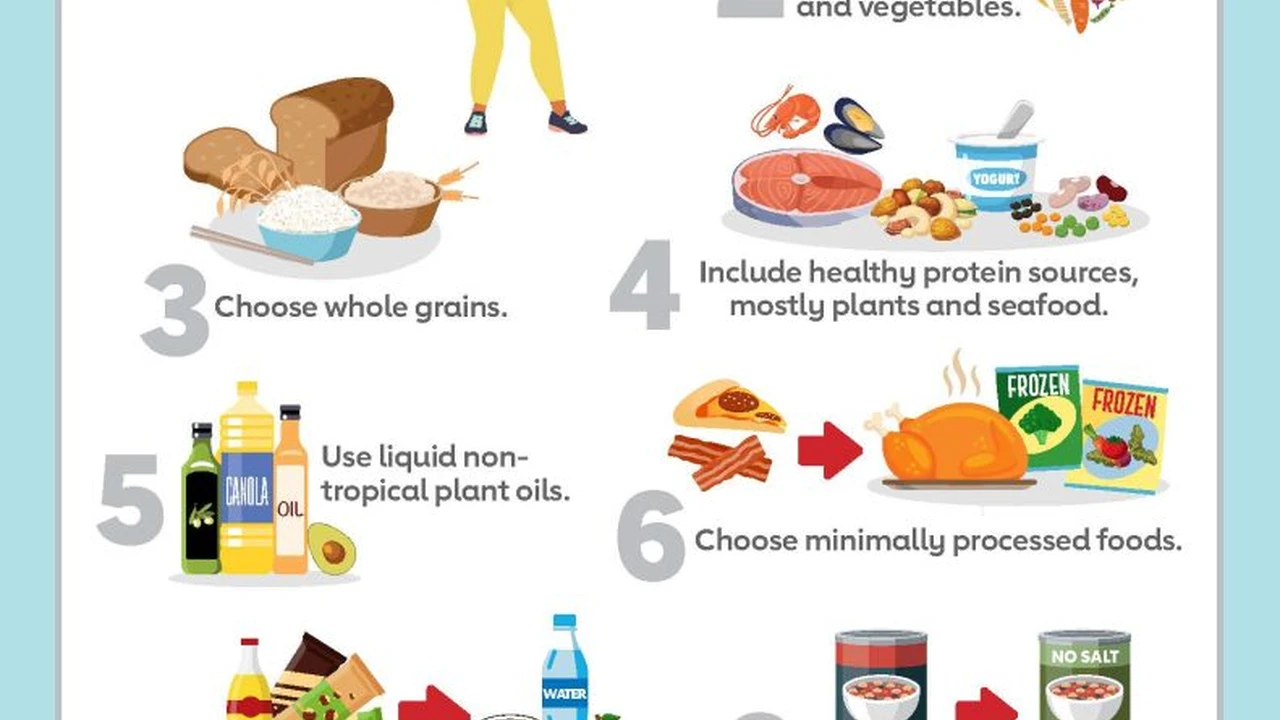7 Best Ways to Prevent Heart Disease, Lifestyle Changes
Sample meta description.

Understanding Heart Disease Risk Factors and Prevention
Heart disease, also known as cardiovascular disease, is a leading cause of death worldwide. It encompasses a range of conditions that affect your heart, including coronary artery disease, heart failure, arrhythmia, and congenital heart defects. Understanding the risk factors is the first step in effective prevention. Key risk factors include high blood pressure, high cholesterol, smoking, diabetes, obesity, physical inactivity, unhealthy diet, and family history. Luckily, many of these are modifiable through lifestyle changes!
#1: Embrace a Heart-Healthy Diet for Cardiovascular Wellness
What you eat plays a HUGE role in your heart health. Think of your diet as the foundation of your cardiovascular system. Focus on consuming plenty of fruits, vegetables, whole grains, and lean protein. Limit saturated and trans fats, cholesterol, sodium, and added sugars. This isn't about deprivation; it's about making smart choices that nourish your body and protect your heart.
What to eat more of:
- Fruits and Vegetables: Aim for at least five servings a day. Think colorful – berries, leafy greens, bell peppers, oranges.
- Whole Grains: Choose whole-wheat bread, brown rice, quinoa, and oats over refined grains like white bread and pasta.
- Lean Protein: Opt for fish (especially fatty fish like salmon, rich in omega-3 fatty acids), poultry without skin, beans, lentils, and tofu.
- Healthy Fats: Include sources of monounsaturated and polyunsaturated fats like avocados, nuts, seeds, and olive oil.
What to eat less of:
- Saturated and Trans Fats: Found in red meat, processed foods, fried foods, and some dairy products. Read labels carefully!
- Cholesterol: Limit high-cholesterol foods like egg yolks and organ meats.
- Sodium: Be mindful of sodium in processed foods, canned soups, and restaurant meals. Use herbs and spices to flavor your food instead of salt.
- Added Sugars: Found in sugary drinks, desserts, and processed snacks. Read labels and choose naturally sweet options like fruit.
#2: Regular Physical Activity for a Stronger Heart and Better Circulation
Get moving! Exercise is like medicine for your heart. It helps lower blood pressure, improve cholesterol levels, and maintain a healthy weight. Aim for at least 150 minutes of moderate-intensity aerobic exercise or 75 minutes of vigorous-intensity aerobic exercise per week. And don't forget strength training! It helps build muscle, which improves metabolism and overall health.
Types of Exercise:
- Aerobic Exercise: Brisk walking, jogging, swimming, cycling, dancing. Find something you enjoy and stick with it!
- Strength Training: Lifting weights, using resistance bands, bodyweight exercises (push-ups, squats, lunges).
- Flexibility and Balance: Yoga, Pilates, stretching. These help improve your range of motion and prevent injuries.
How to Get Started:
- Start Slowly: If you're new to exercise, start with short sessions and gradually increase the duration and intensity.
- Find a Buddy: Exercising with a friend can help you stay motivated.
- Make it Fun: Choose activities you enjoy so you're more likely to stick with them.
- Listen to Your Body: Don't push yourself too hard, especially when you're starting out.
#3: Quit Smoking for Immediate and Long-Term Cardiovascular Benefits
Smoking is one of the worst things you can do for your heart. It damages blood vessels, increases blood pressure, and makes it harder for your heart to get the oxygen it needs. Quitting smoking is the single best thing you can do to improve your heart health. It's tough, but it's absolutely worth it!
Resources to Help You Quit:
- Nicotine Replacement Therapy: Patches, gum, lozenges, inhalers, nasal sprays. These can help reduce cravings and withdrawal symptoms.
- Prescription Medications: Talk to your doctor about medications that can help you quit smoking.
- Counseling and Support Groups: These can provide emotional support and guidance.
- Apps and Online Resources: There are many apps and websites that offer tips, tools, and support to help you quit smoking.
#4: Manage Stress Effectively for Reduced Blood Pressure and Heart Rate
Chronic stress can take a toll on your heart. It can raise blood pressure, increase heart rate, and contribute to unhealthy habits like overeating and smoking. Finding healthy ways to manage stress is crucial for heart health. Think of it as giving your heart a much-needed vacation.
Stress-Reducing Techniques:
- Meditation: Even a few minutes of meditation each day can help calm your mind and lower stress levels.
- Yoga: Combines physical postures, breathing techniques, and meditation to promote relaxation and reduce stress.
- Deep Breathing Exercises: Simple breathing exercises can help calm your nervous system and lower blood pressure.
- Spending Time in Nature: Being outdoors can have a calming effect on your mind and body.
- Hobbies: Engaging in activities you enjoy can help you relax and de-stress.
- Social Connection: Spending time with loved ones can provide emotional support and reduce feelings of isolation.
#5: Maintain a Healthy Weight for Optimal Cardiovascular Function
Being overweight or obese increases your risk of heart disease. Excess weight puts extra strain on your heart and blood vessels, and it can also lead to other risk factors like high blood pressure, high cholesterol, and diabetes. Losing even a small amount of weight can have a significant impact on your heart health.
Strategies for Weight Management:
- Healthy Diet: Focus on consuming a balanced diet of fruits, vegetables, whole grains, and lean protein.
- Regular Exercise: Aim for at least 150 minutes of moderate-intensity aerobic exercise per week.
- Portion Control: Be mindful of your portion sizes and avoid overeating.
- Hydration: Drink plenty of water throughout the day.
- Sleep: Get enough sleep (7-8 hours per night) to help regulate your metabolism and hormones.
#6: Get Enough Sleep for Heart Health and Overall Well-being
Sleep is essential for heart health. During sleep, your body repairs and rejuvenates itself. Lack of sleep can raise blood pressure, increase inflammation, and contribute to other risk factors for heart disease. Aim for 7-8 hours of quality sleep per night.
Tips for Better Sleep:
- Establish a Regular Sleep Schedule: Go to bed and wake up at the same time each day, even on weekends.
- Create a Relaxing Bedtime Routine: Take a warm bath, read a book, or listen to calming music before bed.
- Make Your Bedroom Dark, Quiet, and Cool: Optimize your sleep environment for comfort and relaxation.
- Avoid Caffeine and Alcohol Before Bed: These substances can interfere with sleep.
- Limit Screen Time Before Bed: The blue light emitted from electronic devices can disrupt sleep.
#7: Regular Check-ups and Monitoring for Early Detection and Intervention of Heart Conditions
Regular check-ups with your doctor are crucial for monitoring your heart health. Your doctor can check your blood pressure, cholesterol levels, and other risk factors for heart disease. Early detection and intervention can help prevent serious complications.
Recommended Screenings:
- Blood Pressure Screening: Get your blood pressure checked at least every two years, or more often if you have high blood pressure or other risk factors.
- Cholesterol Screening: Get your cholesterol checked at least every five years, or more often if you have high cholesterol or other risk factors.
- Diabetes Screening: Get screened for diabetes if you have risk factors such as obesity, family history of diabetes, or high blood pressure.
- Electrocardiogram (ECG): May be recommended if you have symptoms of heart disease or risk factors.
Supplements and Products to Support Heart Health
While lifestyle changes are the cornerstone of heart disease prevention, certain supplements and products can provide additional support. Always consult with your doctor before starting any new supplements, especially if you have existing medical conditions or are taking medications.
Omega-3 Fatty Acid Supplements for Improved Cholesterol and Reduced Inflammation
Omega-3 fatty acids, found in fish oil, are known for their anti-inflammatory properties and their ability to lower triglycerides and improve cholesterol levels. They can be particularly beneficial for people who don't consume enough fatty fish in their diet.
Product Recommendations:
- Nordic Naturals Ultimate Omega: A high-quality fish oil supplement with a potent dose of EPA and DHA. Usage: Take two softgels daily with food. Price: Approximately $40 for a 60-day supply.
- Sports Research Triple Strength Omega-3: Another excellent option with a high concentration of omega-3s and a lemon flavor to minimize fishy burps. Usage: Take one softgel daily with food. Price: Approximately $30 for a 60-day supply.
Comparison: Nordic Naturals is known for its purity and high concentration, while Sports Research offers a more budget-friendly option with similar benefits. Consider your budget and preferences when choosing. Both are available online and in health food stores.
Coenzyme Q10 (CoQ10) Supplements for Energy Production and Antioxidant Support
CoQ10 is an antioxidant that plays a crucial role in energy production within the heart cells. It may be beneficial for people taking statin medications, which can lower CoQ10 levels in the body.
Product Recommendations:
- Nature Made CoQ10 200 mg: A widely available and affordable CoQ10 supplement. Usage: Take one softgel daily with food. Price: Approximately $20 for a 60-day supply.
- Doctor's Best High Absorption CoQ10: Formulated with BioPerine for enhanced absorption. Usage: Take one softgel daily with food. Price: Approximately $25 for a 60-day supply.
Comparison: Doctor's Best is designed for better absorption, which may be beneficial for some individuals. Nature Made is a more basic and cost-effective option. Available at most pharmacies and online retailers.
Blood Pressure Monitors for Home Monitoring and Proactive Health Management
Monitoring your blood pressure at home can help you track your progress and identify any potential problems early on. It's especially important for people with high blood pressure or those at risk for developing it.
Product Recommendations:
- Omron Evolv Wireless Upper Arm Blood Pressure Monitor: A convenient and accurate wireless monitor that connects to your smartphone. Usage: Follow the instructions in the user manual. Price: Approximately $100.
- Greater Goods Blood Pressure Monitor: A more budget-friendly option that still provides accurate readings. Usage: Follow the instructions in the user manual. Price: Approximately $40.
Comparison: Omron offers advanced features like wireless connectivity and multiple user profiles, while Greater Goods provides a reliable and affordable option for basic blood pressure monitoring. Both are available online and at pharmacies.
Disclaimer: This information is for educational purposes only and should not be considered medical advice. Always consult with your doctor before making any changes to your diet, exercise routine, or supplement regimen.
:max_bytes(150000):strip_icc()/277019-baked-pork-chops-with-cream-of-mushroom-soup-DDMFS-beauty-4x3-BG-7505-5762b731cf30447d9cbbbbbf387beafa.jpg)






